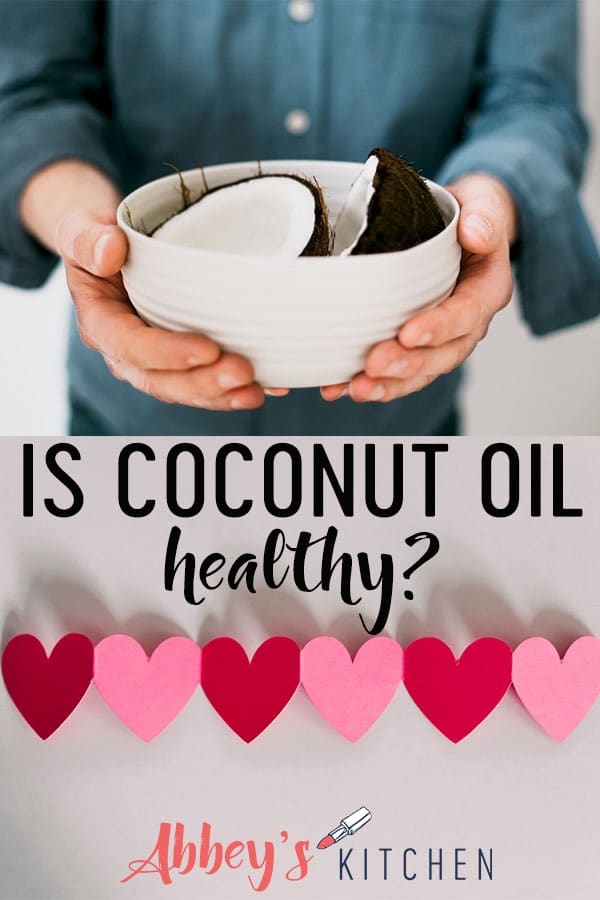I dive into the research and answer the question does saturated fat cause heart disease and is the plant-based coconut oil healthy?
As you can see from reading Part One last week on Saturated Fat, saturated fat and cholesterol are complicated and the research surrounding their impact on health is conflicting, despite the large amount of research. There are reasons why research isn’t simply black and white, which I will get into a bit later. But first, I will answer the question, does saturated fat cause heart disease, diabetes and death.

Because there is so much research regarding saturated fat and cholesterol with health, many systematic reviews and meta-analyses exist. Unfortunately, they have not helped nutrition professionals come to a conclusion as to whether saturated fat has any impact on our health. In one Canadian meta-analysis and systematic review in the British Medical Journal, the authors concluded that saturated fat is not related to coronary heart disease, cardiovascular disease, ischemic stroke, type 2 diabetes, or all-cause mortality (aka death). In fact, replacing these foods with carbohydrates (the type of carbs was not disclosed in most studies) had no beneficial impact, but replacing saturated fats with monounsaturated and polyunsaturated fats had a positive impact on our cholesterol levels. It is important to note that the authors stated there was high “heterogeneity”. Basically, this means that all the studies they looked at were very different from one another which makes running any statistical analysis difficult (in other words, it wasn’t “apples to apples” (no nutrition pun intended!) The authors also found that trans fat was associated with coronary heart disease, cardiovascular disease, ischemic stroke, type 2 diabetes, and all-cause mortality. In another systematic review and meta-analysis, authors came to a similar conclusion but you knew that because we covered that in our Saturated Fat part 1.

In the Presidential Advisory from the American Heart Association, a different conclusion was made. The authors of this paper stated that although there are various meta-analyses and systematic reviews available, the high heterogeneity between each study leads to many issues. As well, they noted that since carbohydrate type was not mentioned in most studies, this limits the argument that carbohydrates in general have no impact on heart health, since whole grains have a plethora of heath benefits. This in-depth review looked at studies since the 1950’s to come to their conclusions (however, there are some limitations that I will discuss later). One of the conclusions they made was that replacing saturated fats with polyunsaturated fats (and to an extent, monounsaturated fats) can reduce the risk of heart disease by about 30% and lower LDL cholesterol (bad cholesterol, if you recall). The authors also found that trans fats play a clear role in increasing the risk of heart disease. Dairy was also addressed in this review and it was noted that dairy products, such as cheese and milk, can raise LDL cholesterol. However, since most people opt for lower-fat options, the authors stated that this would have less of an impact. They also mentioned that when LDL was replaced by either whole grains or monounsaturated and polyunsaturated fats, the risk of heart disease and stroke decreased. Finally, the authors concluded that the saturated fat found in coconut oil does increase LDL cholesterol. In fact, it was found that coconut oil significantly raises LDL cholesterol compared to olive oil, which makes sense since olive oil is quite high in monounsaturated and polyunsaturated fats and is low in saturated fat. This statement caused a lot of debate in mid-2017, when the report was released.

In a systematic review and meta-analysis on butter consumption, it was found that there was a “small to neutral” effect of butter on heart disease, type 2 diabetes, and all-cause mortality. This means that after reviewing the available literature, there were no clear indications that butter (high in saturated fat) was the main contributor to these diseases. Does that mean you should eat a pound of butter? Absolutely not.Too much of anything isn’t good for you. While this study found little to no effect from eating butter, it also mentioned that unsaturated fats have wonderful health benefits. So, if you like to have some butter on your mashed potatoes, go for it. But remember to try to get unsaturated fats from a diverse set of foods.
Did the AHA get it wrong about whether or not Saturated Fats Cause Heart Disease?

Nutrition research is flawed. It’s not that we don’t have amazing, credible scientists in the field of nutrition, because we do. The reason it’s flawed is because of a few reasons:
- Study design: There are many different study designs. The crème de la crème are meta-analyses and systematic reviews, which involve a very thorough review of all the research available on a certain topic. The next would be randomized-controlled trials, ideally blinded (meaning the researchers do not know who has what treatment). Unfortunately, the problem with these studies for nutrition is that it’s very difficult to have two large groups of people eating a particular way (e.g., high saturated fat in one group and little to no saturated fat in the other group) for a long period of time with complete adherence. Think about it, could you really try a high saturated fat diet for let’s say for two years? You wouldn’t have any freedom of choice in terms of the food you eat. This is why it’s difficult, because participants may not actually adhere to their diet or drop out of the study. The next common study researchers use is a prospective cohort study (AKA observational). These studies involve taking a group of people who are free of a disease (e.g., heart disease), look at their eating patterns over a period of time (e.g., 5 years) and see who get the disease. Usually the researchers have the participants fill out different food questionnaires or surveys to understand their general eating patterns during this time. They also screen for genetics and other lifestyle factors. However, the problem with this is that the researchers cannot be certain that “X caused Y” because the food they ate was not controlled. So, was it the saturated fat? Was it the cholesterol? Was it the high refined carbohydrates? Was it the fact that the people who ate less saturated fat also ate more vegetables? It’s hard to tell, but we do have excellent statistical analyses that try to overcome this. That being said, it’s still not for certain.
- Confounding variables: This means that different things can cause a disease. For example, heart disease can be diet-related, weight-related, genetic-related, smoking-related, and so on. Good research will control for these variables to make sure that it wasn’t genetics that actually caused the disease instead of the food. Sometimes this can be tricky and sometimes certain things are not included. So, for example, the authors of the AHA paper stated that a lot of studies left out the type of carbohydrate (e.g., whole grains vs. refined sugars) which makes their conclusion that carbohydrates don’t improve heart health seem null and void.
- Data collection methods: If a research team is doing a prospective cohort study, they will use a few different tools to collect the data such as food frequency questionnaires, 24-hour recalls, food diaries, etc. There are a few problems with this. First, the participants may not be telling the truth or may over/underexaggerate or simply forget what they ate (do you generally remember all the foods you ate in the past 6 months?) Second, participants may not be able to properly identify the portions of food they ate which can significantly change the nutrient profile of their diet. Third, if a food item is not included on a food frequency questionnaire then a participant may choose a similar, but still different, item. All of these can lead to different macronutrient and micronutrient values and have the potential to influence the outcome of the study, provided a large amount of people had these issues.
- Money: Research studies are very expensive which can limit the number of studies researchers can run. Prospective cohort studies are less expensive than randomized-controlled trials for the most part, which is why you likely would see more of these. As well, funding is usually given to research in a “hot” area. So, unless your topic is “hot”, it may be hard to get the funding, therefore limiting the type of research they can conduct.
- Cherry picking: A systematic review and meta-analysis will look at all studies available, regardless of the outcome and study design. There are statistical analyses that can weigh the studies based on their qualities. When you start to cherry pick, or basically pick the study that serves your purpose, there is tremendous bias in your conclusion. As well, if you start to leave out studies based on certain aspects, you’re also introducing bias. The problem that I see with the AHA statement is that they left out a lot of studies because of heterogeneity (apples to oranges). Now, it is important to say that heterogeneity is a problem, as we want studies to be as close to each other as possible so that we can genuinely look at the outcomes. In the other systematic reviews and meta-analyses that I looked at (here and here, for your convenience), they did mention this as a strong weakness to their conclusions. However, I do not feel comfortable with AHA picking a couple studies, most of which were before the 1980’s, and making a conclusion based on that. To start, we have changed our eating patterns over the past decades, especially when it comes to saturated fat. So, it’s difficult to say if those studies truly represent our current population. Second, while studies may be different from one another, many of which were still solid research and should not be excluded because it wasn’t similar enough to another study. Third, choosing studies based on their results can lead to significant bias. This is why systematic reviews and meta-analyses look at all kinds of research, including grey literature and open-access journals, since these types of publications tend to show null or unfavourable outcomes. A lot of journals publish “exciting” outcomes, which can also be a huge problem.
Does Coconut Oil Cause Heart Disease?

With regards to the question of does coconut oil cause heart disease, I take issue with how AHA dealt with it. For example, the review they cited also mentioned that coconut oil raised HDL cholesterol, yet AHA only mentioned they raise LDL cholesterol. That one isn’t too big of a deal, but I like transparency. The other issue with just using this review is that the study looked at one outcome: heart disease. It did not look at other outcomes, of which coconut oil may or may not have beneficial effects on. Also, the authors of that study do not call their review a systematic review, but AHA does. Which can be concerning since there may have been studies that were not included or missed. Finally, the authors of the review noted that current research is very limited and more research is needed. So, really, to make a large conclusion like the AHA did seems a little premature. Now, with that being said, they did get one thing correct: “A recent survey reported that 72% of the American public rated coconut oil as a “healthy food” compared with 37% of nutritionists. This disconnect between lay and expert opinion can be attributed to the marketing of coconut oil in the popular press.” Just because there isn’t enough research to say whether or not coconut oil is healthy, doesn’t mean we should give it a “health halo”. Marketing of coconut oil has exploded in recent years, which can give people the impression that it is really good for you. Most Registered Dietitians and other nutrition professionals agree that coconut oil should be treated like any other saturated fat and enjoy it in moderation. If you’re having coconut oil with every meal and labelling it as a miracle cure, you’re not only increasing your saturated fat intake, but you’re also increasing your calorie intake by a lot, which we do know we want to watch out for. So, if you like coconut oil, have it. But like I mentioned earlier for butter, make sure you’re also getting a good source of both monounsaturated and polyunsaturated fats in your diet.
Eating Tips to Reduce the Risk of Heart Disease

Although there is still a lot of confusion out there, there are still things you can do to lower your risk of certain diseases:
- Increase your vegetable and fruit intake: Vegetables and fruit are full of vitamins, minerals, antioxidants, phytochemicals, fibre, and more. The fibre in fruit helps keep you full and maintain good blood sugar levels since it is digested slowly.
- Include a protein source at every meal: protein provides us with essential amino acids to build our muscles, bones, and other tissues. It also helps to keep us full since it takes a while for our body to digest it. Good sources of protein include: beans and lentils, fish, lean meat (e.g., chicken or turkey), tofu, and eggs. Dairy can be a great source of protein but be sure to have a lower-fat version that is unflavoured (flavouring has a lot of unnecessary sugar)
- Choose whole grains over refined grains: Whole grains are full of nutrients and fibre and have been found to have beneficial effects on cholesterol and heart health. Be sure to look for the term “whole grain” as this means the entire grain is intact. “Whole wheat” or “multigrain” is not the same as “whole grain”, but these options would still be better than white flour.
- Limit your intake of sugary beverages: Sugar consumption has been linked to weight gain. It also leaves our stomachs and is absorbed quickly which leads to a spike in blood sugar and leaves us feeling hungry shortly after. Opt for water, milk/plant-based beverages, or add some herbs and fruit to your water.
- Eat whole food: Try your best to leave eating out for special occasions. When we eat from home and prepare our own meals, we control the ingredients. Therefore, we have less sugar, salt, and added fat that most restaurants and food companies add to increase flavour. We also control our portion sizes, which can help with maintaining a healthy weight.
So Seriously, Does Saturated Fat Cause Heart Disease?
I strongly believe we need to stop vilifying food and this includes saturated fat. While the research is mixed, I do believe we should err on the side of caution. Does this mean I will stop having food with saturated fat? Absolutely not. Does it mean that I will try to eat a diet full of variety? Absolutely. I believe that when we eat a diet full of variety, we’re providing our body with the important nutrients it needs while also satisfying our desire for delicious and diverse food. While I don’t recommend eating a double cheeseburger every day, I also don’t advise against treating yourself every now and then. If you increase your intake of vegetables, fruit, whole grains, and protein, you’re likely going to be pretty full and therefore control your intake of any saturated fat. As well, making sure you’re getting enough exercise throughout the week will also help with your overall physical and mental health. So, enjoy your food, eat a well-balanced diet, and remember life is too short to completely eliminate the foods you love!
Now tell me your thoughts on saturated fat. Does saturated fat cause heart disease and other chronic ailments in your books?
Do you enjoy foods with saturated fat?
What do you think about the AHA’s recommendations on saturated fat?
Leave me a comment below with your thoughts and be sure to check out Part 1 over here!

Updated on August 31st, 2022

Abbey Sharp is a Registered Dietitian (RD), regulated by the Ontario College of Dietitians. She is a mom, YouTuber, Blogger, award winning cookbook author, media coach specializing in food and nutrition influencers, and a frequent contributor to national publications like Healthline and on national broadcast TV shows.




Petra says
Hi Abbey,
For what it’s worth, I am disabled (limited walking) and follow a keto diet. At the 6 months point I had dropped 50 lbs. I had blood work done at this time. My triglycerides were cut in half. That itself told me what I was doing was healthy. Yes my overall cholesterol went up but I understand that LDL are transporters and my body is releasing large amounts of stored fat so it makes sense.
(www.cholesterolcode.com)
I am not afraid of healthy fats, including sat fats (no seed oils though). I am not afraid of (pink or sea) salt. People on keto require more salt since they don’t eat high carb or processed foods.
Also of note, no more migraines, better moods, more energy, more mental clarity (no brain fog), better sleep, not always hungry! Bonus, if you’re insulin resistant or type 2 diabetic, weight loss happens. Less glucose (carbs)= less insulin. (Insulin is a fat-storing hormone). It reduced my husband’s blood pressure (and weight). My 78 year old mother controls her type 2 Diabetes without meds, eating low carb, not necessarily keto.
What’s not to love? ?
Abbey Sharp says
Glad the diet has worked for you Petra. Thanks for sharing
Jeremy says
Thanks for such an insightful and scientifically accurate post!
As a scientist, I am glad to see information about our health that is actually based on clinical research and meta-analyses reach the public. All the studies are really well explained!
Abbey Sharp says
Thanks so much Jeremy!
Morris Berengut says
Abbey:
Excellent articles – well researched and presented. Thank you.
As to your question regarding sat fat intake. I was inculcated from a very early age to avoid sat fats. A close relative had a heart attack in the 1960’s and amazingly survived that and 2 more into their 70’s. At that time, sat fat was vilified and my entire family took on the challenge of eating little or no sat fat. I just got used to it and to this day I’m not comfortable eating the excess fat on meats or other sat fats – I trim fat religiously. And really I don’t miss it at all. It’s really easy to eat a low sat fat diet (as long as you’re not married to burgers and fries and such).
I also watch sugar to a degree since I know that many processed products that are ‘low fat’ are also higher in sugar in order to make up for the reduction of acceptable ‘mouth feel’.
And let’s not get into the entire sodium debacle. Of course, the relative I spoke of above also had to eschew sodium in all its forms so our family followed suit. That’s actually the most difficult to avoid in so many processed foods and restaurant foods. Perhaps a review of sodium in our diet could be your next project (if you haven’t already done that).
Abbey Sharp says
Sodium is definitely something else I need to tackle. Thanks so much for your comment Morris
Mikki says
What a great post! So much information to help people make informed decisions.
Abbey Sharp says
Most definitely!
Chrissy says
Love this overview of the research, and totally agree with your conclusion – no vilifying individual foods and let’s just enjoy a wholesome, balanced eating plan.
Abbey Sharp says
Right! Keep it simple, like I always say
Jessica Levinson says
You did a great job in your research for this post! Very good insight into a highly debated topic. Your tips to reduce heart disease are spot on.
Abbey Sharp says
Aw thanks love. I hope so!
Kelly says
What a great job explaining the nuances of all the information out there. It’s all about looking for that healthy balance!
Abbey Sharp says
Definitely a lot of information! Definitely agree. All about balance.
Deborah Brooks says
It is definitely all about finding a balance that works for you and your body
Abbey Sharp says
Totally !
Rachel says
Honestly? I just eat across the rainbow and everything in moderation. Heart disease runs in my family so I’m already a waking heart attack risk. I exercise and eat well and that’s all I can really do. I rarely eat out at restaurants so I think I have a fairly good handle on my nutrition. It’s all I can do!
Abbey Sharp says
Sounds like it! Thanks for sharing love
Emily @Sinful Nutrition says
Love all of this research! Thanks so much for sharing the word!
Abbey Sharp says
Thanks Emily!
rebecca says
great analysis of the research & tips to improve health. thanks so much!
Abbey Sharp says
Thanks!
M.K. Spaulding says
Excellent Abbey! I have been saying this for a while now (only with fewer words lol) 😀
Abbey Sharp says
hah thank you!